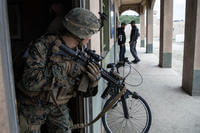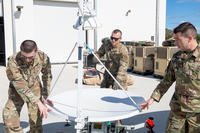Last month, you read here about the prospects for a new laser countermeasure that defense contractor ITT hopes could protect Army helicopters from missiles. Long story short, here's how it works: A sensor detects a launch, slews a laser onto the vector of the incoming missile, and then blinds the sensors in the weapon's nosecone in mid-flight, all in seconds or less. Problem is, this system and others like it depend on bad guys using relatively "smart," guided missiles that have sensors for your laser countermeasure to defeat. As Saturday's horrific helicopter crash in Afghanistan showed, sometimes the bad guys aren't that advanced.
Pentagon officials said Monday their best guess is the Army CH-47 Chinook went down after being struck by a simple, unguided rocket propelled grenade -- in all likelihood, the ubiquitous, shoulder-fired RPG-7. The flight path of its warhead is determined by simple physics, not complicated electronics: You aim, pull the trigger, and its round flies until it runs out of fuel or hits something. DoD officials acknowledged it's one of the toughest weapons to guard against, along with simple small arms. If a helicopter is moving slow and low enough, and you're a good enough shot, you've got a chance of at least damaging it, even with an RPG or a rifle.
So what can be done? In an ideal situation, you don't want to get shot at in the first place. In Iraq and Afghanistan, transport helicopters often operate with escorts from gunships -- Marine Corps AH-1 Cobras or Army AH-64 Apaches -- which arrive bristling with missiles and their main guns to make sure landing zones are safe before troops go in. But they're not always available. So would it be possible to adapt a laser countermeasure against an unguided rocket? Theoretically, yes, but your laser would have to be powerful enough to destroy the threat, and that probably means you have to add a lot more weight to your aircraft and draw a lot more energy -- if your sensors can spot and track an incoming RPG well enough. It's a daunting challenge, but in the aftermath of Saturday's crash, don't be surprised if there's a renewed interest in exactly such a system.









